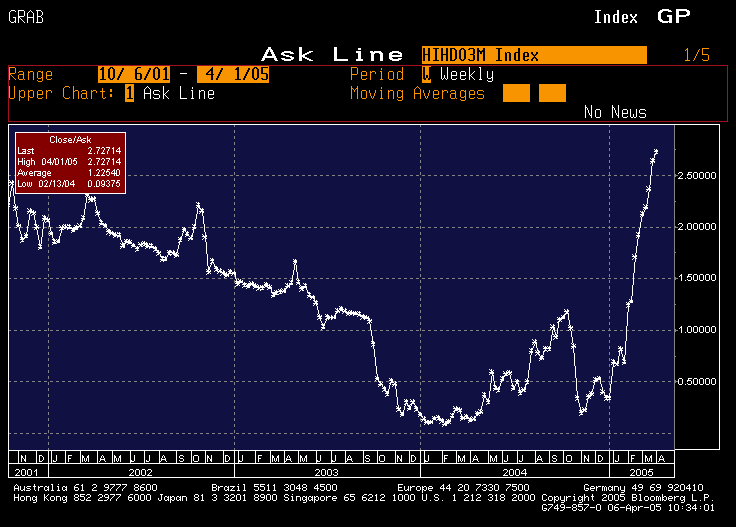|
| ||
|
April 06, 2005
You are on the invidual archive page of Scenes from a property bubble. Click Simon World weblog for the main page.
|
|
Scenes from a property bubble
What Hong Kong property can tell us about China's currency peg. From today's SCMP business pages: Speculators seek quick exit from higher ratesThe SCMP property section: Speculators in rush to dump holdingsIn the extended entry is a chart of 3 month HIBOR (i.e. the lending rate between banks in Hong Kong dollars).
Why have HIBOR rates shot higher? Because in the past few weeks money has been flowing out of Hong Kong. For months and years Hong Kong's banking system has suffered excess liquidity. It literally had more money than it could lend. So the "price of money", interest rates, fell to entice more borrowing. But it didn't work. That's why rates got close to zero. This wasn't helped by the low rates in the USA. Because the Hong Kong dollar is pegged to the US dollar, the Hong Kong Monetary Authority must let HIBOR float freely. If you fix the rate of currency exchanges, the interest rate that balances out the FX flows must float. The Fed started tightening rates but HIBOR didn't move because plenty of money stayed in Hong Kong, figuring if the Chinese revalue the yuan the Hong Kong dollar will revalue as well. While it's impossible to tell for sure, I'd wager that the flight of money from Hong Kong reflects a similar flight of "hot money" from China. Plenty of people are still willing to bet on a yuan revaluation, but it's been a long wait and suddenly other opportunities are looking better. This is especially if the yuan is only moved to a narrow trading band of say 3% of its peg - that's nowhere near enough to justify the costs of carry on the revaluation trade. Which ironically improves the chances of a revaluation on the yuan. posted by Simon on 04.06.05 at 11:49 AM in the
Trackbacks:
TrackBack URL for this entry: http://blog.mu.nu/cgi/trackback.cgi/73978 Send a manual trackback ping to this post.
Comments:
Music to my ears. I sold my flat last summer and the fucker has since shot up half a million dollars, irritating me more than somewhat. That was a good post. posted by: Harry Hutton on 04.06.05 at 12:22 PM [permalink]So now you can come back to Hong Kong, buy a cheaper flat and use the money to buy me a beer. Thanks, Harry. posted by: Simon on 04.06.05 at 12:43 PM [permalink]Are you an economist? Something I never understood: are high interest rates deflationary in themselves, or only through their effect on the money supply? If the US dollar falls and they maintain the peg, that should be expansionary whatever happens to interest rates, should it not? Or have I overlooked something obvious? posted by: Harry Hutton on 04.07.05 at 01:11 AM [permalink]I wouldn't say economist, but I've studied plenty of economics. The short answer is no. The important distinction to make is between nominal and real (i.e. after inflation) rates. If inflation is 5% and rates 6%, the real rate is only 1%. It's also important to note that interest rates are a price themselves - the price of money. Deflation/inflation is commonly referring to the changes in the prices of a basket of goods and services. To some extent interest rates feedback into inflation via their impact on imputed rents and mortgage costs. Anyways, if real rates are high that puts a squeeze on discretionary spending by consumers and investment by business which should reduce price pressures/inflation. But it is a second order effect and not always clear. Talking about money supply is just another way of talking about interest rates - as I said rates are the price of money. So to the crux of your question. A fall in the US dollar is, if the peg stays, the same as a fall in the HK dollar. Because the HK dollar is fixed, prices need to adjust instead to balance out flows. Let's say you have a crate of oranges. If it was worth HK$100 before but now the HKD has fallen, the same crate should cost more, say HK$110. At the same time HK people have less purchasing power on imports because their HK dollars can't buy as much as before. but for HK exporters it's boom time, because they have HK costs but receive (say) Euros as revenue. The net impact is the falling dollar will be expansionary for an economy such as Hong Kong's which has a trade surplus. Another way to think about this is the level of the dollar and the level of interest rates are tightly linked. In fact in New Zealand for a while they were explicitly linked. I could go on about this for a long time as it is a complicated question. But your basic premise is correct - a falling HK dollar should be expansionary...except the rapidly rising Hibor rate argues that money is flowing out of the city and will thus be bad for asset markets such as property. Let me know if you want me to go on. posted by: Simon on 04.07.05 at 12:40 PM [permalink]There’s a thing called the "Imposible Tinity". If I remember rightly it is: a floating currency, free movement of capital and control of the money supply- you can have any two of them, but not all three. Hong Kong has the first two, so they have no control over supply of money. posted by: Harry Hutton on 04.08.05 at 11:18 PM [permalink]Bollocks, this keyboard is sticky. That's "Impossible Trinity". posted by: Harry Hutton on 04.08.05 at 11:19 PM [permalink]I should have said the last two, not the first two. posted by: Harry Hutton on 04.10.05 at 06:44 AM [permalink] |
|
